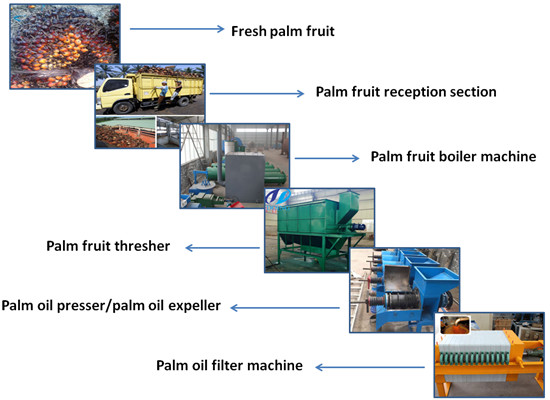Red palm oil extraction process
This article is aimed to give a brief description of how palm oil is extracted. Palm oil is an edible oil, derived from the flesh of palm fruit. In the unprocessed form it has a bright red color and is solid.
Below you may find steps,how palm oil is extracted from palm fruit.
Harvesting: The oil palm tree produces fresh fruit bunches all year round, but there are periods of high and low productivity. The majority of the oil is formed in the last two weeks of this process and a correct judgment of the ripeness is essential to assure a good production. The bunch is removed from the plant by hand with the aid of harvesting tools (sacho and scythe).

Palm oil extraction process
The main extraction steps are:
Sterilization: The bunches are cooked with live steam for 90 – 120 minutes. Sterilization objectives are: Lipase enzyme inactivation, making fruits easily release from bunches, making fruits softer, making nut/pulp separation easier, and coagulation of proteins.
Threshing: After bunches are cooked they are fed to the thresher which is a drum with holes in the side where bunches are centrifuged to separate the fruits. The bunch waste is incinerated and the ash, a rich source of potassium, is used in a compost.
Digestion: Digestion is the process of releasing the palm oil in the fruit through the breaking down of oil-bearing cells. Fruits are lifted by a cup elevator to the top of the digester vessel. This vessel contains a live steam heating system and agitator shafts. The main aim during digestion is to break oily cells, in order to make oil extraction easier. This process takes 30 minutes at 90 – 100 ºC.
Pressing: Pressing is made just after the material leaves the digestion vessels and it produces a slurry made of approximately 53% oil, 40% water and 7% solids and also a cake that consists of fiber and nuts. Method of pressing could be dry or wet. Dry method is oriented on squeezing the oil out of the mixture of oil, moisture, fibre and nuts by applying mechanical pressure on the digested mash. Wet method uses hot water to leach out the oil.
Clarification, Purification, and Packaging: This step consists of separation of oil from impurities (water and fine solids) made in settling tanks and three phase decanters. Recovered oil is then purified in plate centrifuges and dried under vacuum. Finally, the Extra Virgin Palm Oil is filtered to remove any remaining particulate matter and packaged in drums.
Oil Extraction Losses: Empty bunches and solids from clarification are used as organic fertilizers on certified organic plantation. Fibers still have around 7% oil and shells are used in the boilers as fuel. As a result, all extraction mills are able to generate their own electricity by steam turbines.
